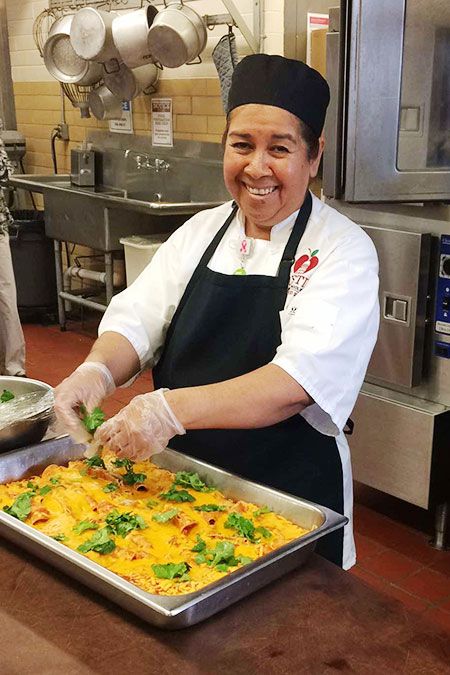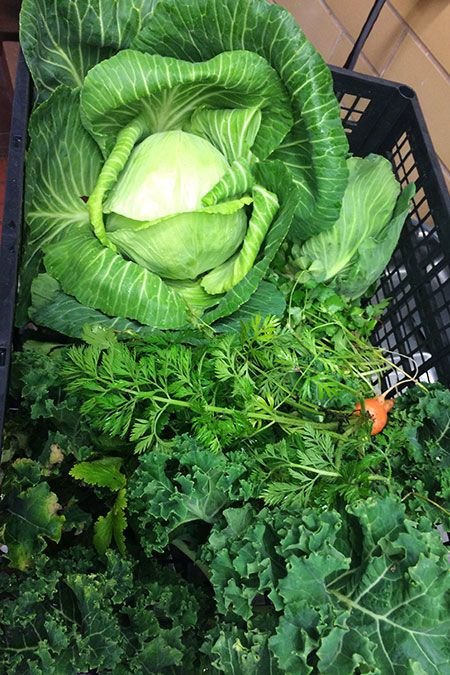One of the most unique and immensely gratifying results of school food gardens is that students can harvest and eat what they grow. Once a child has been exposed to growing their own food, there is no end to the benefits that will last a lifetime. Research shows that school gardens lead to increased consumption and preference for fruits and vegetables for students [1] [2] [3] [4].
AISD’s Garden to Café program, launched in fall of 2016, bridges the gap between harvesting fresh garden produce and adding it to school meals. The program allows schools to serve produce from the school garden in school meals during lunchtime. Schools that apply to participate in the program are evaluated on water quality, protection from contamination, sanitary practices and harvesting procedures to ensure the safety of the food served in the cafeteria.
Recently, we checked in with Lindsey Bradley at AISD’s Nutrition & Food Services Department for an update on the program. Currently, there are five approved Garden to Café schools: Becker, Brooke, Pease, Kiker, and Ziker Elementary Schools. “We encourage any Austin ISD campus interested in participating in Garden to Café to begin the process by submitting the Austin ISD School Garden to Café Conditions for Use of Garden-Grown Produce in School Kitchens. Schools participating in Garden to Café are encouraged to participate in seasonal ‘call to plants.’ The ‘call to plant’ will provide recommended crops that will be placed on menus upon the estimated time of harvest. Other fruits and vegetables grown in approved gardens may also replace a menu item with the same color vegetable, or be offered in a tasting portion to students. The first ‘call to plant’ was greens and will remain as the featured ‘call to plant’ item for the duration of the 2016-17 school year,” says Lindsey.
Lindsey also shared updates from participating schools:
“When we came back from Winter Break the vegetables had grown considerably and were ready to harvest. It was like getting a last Christmas present for my students. The cabbage had started to make heads, the broccoli was making crowns and the lettuce was ready. We selected which plants looked the best, picked them, washed them, and put the discarded refuge in the compost. Then the students went to weigh the produce, fill out the paperwork and delivered them to the cafeteria which was happy to get them. It was a good way to bring the gardening lesson to a conclusion and the students had fun.” - Sam DeSanto, Brooke Elementary teacher & garden leader
“It goes without saying that we are very excited with the direction that Anneliese Tanner is taking the district concerning local, healthy food. She really has been a leader in bringing the focus on local food sourcing for the district… In my opinion, the Garden to Café program represents the best of what our district has to offer. Bringing organic, campus-grown produce into our cafeteria is a huge achievement! This program completes the cycle and allows students to literally reap the rewards of all their hard work. The week before winter break we made our first contribution to the Zilker cafeteria. The mixed greens were served as a salad. Our cafeteria manager Gilma Cruz has been amazing and has done an excellent job prepping and serving our veggies! I am very proud of AISD's renewed focus on outdoor education and healthy food. We hope to make many more contributions to our cafeteria this winter and spring.” - Mathew Garland, Zilker Elementary teacher & Jabo’s Garden (school garden) leader
References:
1. Heim, S., Stang, J., & Ireland, M. A. (2009). A garden pilot project enhances fruit and vegetable consumption among children. Journal of the American Dietetic Association, 109, 7, 1220-1226.
2. McAleese, J.D. and Rankin, L.L. (2007). Garden-based nutrition education affects fruit and vegetable consumption in sixth-grade adolescents. Journal of the American Dietetic Association, 107, 4, 662-665.
3. Parmer, S., Salisbury-Glennon, J.; Shannon, D., & Struempler, B. (2009). School gardens: An experiential learning approach for a nutrition education program to increase fruit and vegetable knowledge, preference, and consumption among second-grade students. Journal of Nutrition Education and Behavior, 41, 212-217.
4. Robinson-O’Brien, R.; Story, M.; & Heim, S. (2009). Impact of garden-based youth nutrition intervention programs: A review. Journal of the American Dietetic Association, 109, 2, 273-280.



